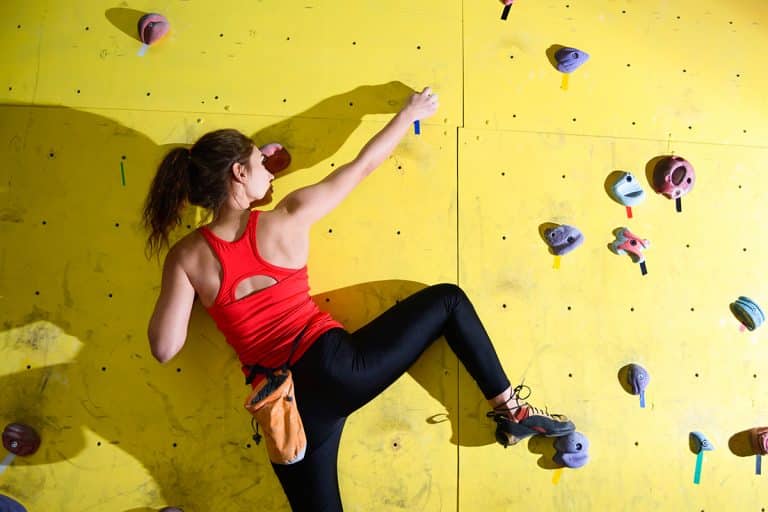More importantly, being “good” at bouldering is also subjective. Different people have different benchmarks for what “good” and this depends on what your climbing goals are.
Settings goals in bouldering take many forms. It can be as simple as getting to climb in the gym once or twice a week.
It can be being more mentally alert and focused or mastering footwork and heel hooks or consistently progressing through a harder grade every over as series of sessions. Whatever your goals are, make sure they are right for you, in line with your personality, and challenge you to be your best.
How Do You Train and Get in Shape for Bouldering?
The best way to prepare for bouldering is to start bouldering! It can be indoors or outdoors depending on your preference. Having a training plan focused on strength and endurance also helps to keep up with the demands of the sport.
A fitness regimen composed of a mix of cardio, upper and lower body, and core workouts, combined with proper warm up and cool down sessions is a good supplement to finger strength training and bouldering.
How Do I Get Started in Bouldering?
The idea of bouldering seems fun yet intimidating. If you have friends who are already into bouldering, they can show you the ropes on how to get started. For some who are not so lucky, starting small is the way to go.
Do a quick Google search of the climbing gyms in your area and just give it a go! You’re bound to meet people who are more than happy to help and answer your questions.
Lastly, patience is key. It’s easy to get overwhelmed when you go in and see people do all sorts of moves and techniques, but by consistent effort, you will start to see progress in no time. Don’t forget to have fun!
How Often Should a Beginner Boulder?
Take it slow by climbing a maximum of three times in a week. Give your body time to adjust to this new type of exercise.
As much as possible, avoid climbing on consecutive days to allow your muscles to recover and heal.
How Can a Beginner Get Better at Bouldering?
If you are new to the sport, read on for some tips for beginner boulderers:
- Wear the right gear: Maybe you rented gear your first few climbs at the gym, but if you have already caught the climbing bug, it’s best to invest in your own bouldering gear. It will not only save money but choosing your own gear means you can get the right one for you. Plus, it’ll last you a while! Invest in good climbing shoes, proper activewear suitable for climbing, chalk, chalk bag, and a brush. Throw in some finger tape too, and that’s about it for your necessaries.
- Know your warm up: To get the most out of your climb and avoid injury, you must know and do proper warm-up exercises. This includes a bit of cardio or pulse raiser like jogging or cycling, stretching your muscles, and a light climbing session.
- Learn basic techniques and principles: You don’t have to be an expert from the get-go but knowing the foundation movements and footwork is a sure way to progressing quickly.
- Understand bouldering grades: If the grades confuse you, take a few minutes to look it up or ask someone about it. Grades can help you gauge your own skills and compare them with different routes and problems.
- Find a climbing partner: It can be intimidating to go alone your first time at the climbing gym. Try asking a few interested friends to sign up at the local gym with you or find a fellow beginner and exchange numbers.
- Ease into bouldering: Slowly get into the habit of climbing and don’t overdo it. Give your body time to adjust and get rest days in between climbing days to recover fully. Proper and consistent climb and rest days are essential so you are in good shape as you progress.
- Practice “silent feet”: Silent feet mean exactly what you think it is. It’s climbing silently. Doing this drill improves your footwork as you focus on making as little noise as possible.
- Ask more experienced boulderers: If you’re stuck on a problem, you can ask for a beta from a more experienced climber. This way, you can learn from their strategies and approach to specific bouldering problems.
How Do I Improve My Bouldering Skills?
Check out these tips to improve your skills and take them to the next level!
- Climb regularly: You have probably heard this a million times but practice absolutely makes perfect. Try to have a consistent schedule as much as possible as you work on your climbing fundamentals. You can find a partner or join a climbing group to keep you accountable if your schedule allows it.
- Perfect the basics: Make sure you’ve got your basics down pat and frequently check on areas that need improving. If you have a hard time with footwork, spend extra time working on it, ask longtime boulderers for tips, and watch how others climb. There’s no shame in being a beginner!
- Don’t shy away from a challenge: Once you get the hang of bouldering, don’t let yourself take on the same problems. Change it up! Try boulders and routes that challenge you mentally and physically. If you’re used to climbing in the gym, maybe join a group and try a few outdoor sessions to see how it feels.
- Patience is a virtue: All great achievements require time and the same can be said with bouldering. Keep at it and over time all the persistence and hard work will add up!
What Should I Eat Before Bouldering?
Before a climb, opt for healthy carbohydrates to fuel your muscles and keep you energized throughout. Choose from a healthy variety of fruits and vegetables, whole wheat grains, and beans. Some examples are rice, oatmeal, yogurt, tortillas, and potatoes.
Avoid sugary foods, cereals, white breads, and other overly-processed carbs that don’t provide you with the right nutrients you need. In addition to eating right, don’t forget to hydrate and drink lots of liquid.
How Often Can You Boulder in a Week?
Beginners should climb three times in a week at the maximum. Avoid consecutive climbing days to give room for rest and recovery. Once you progress, you can increase the frequency of climbs.
Should I Boulder Two Days in a Row?
If you decide to climb on consecutive days, vary the intensity of the climbs. Alternate easy and hard climbs. Dedicate a day for intense climbing and another for working on footwork, technique, etc.
Can You Boulder Every Day?
For beginners, climbing daily is discouraged. In fact, you should avoid it altogether until the body has adapted to bouldering. Observe proper training, climbing, and rest cycles so you are functioning at your very best every time you climb.
Once you have acclimated to the sport, you can increase the number of sessions depending on what works for you.
How Long Should a Bouldering Session Last?
The duration of bouldering sessions also varies on the intensity of the climb. If you’re just starting to climb and would like to take it easy, dedicate around 2 to 3 hours. Take the first few minutes 20-40 minutes to warm up and then go for the problems next.
Also, keep in mind to take breaks to recover. Others might take longer hours to boulder as they also socialize with other climbers.
How Do You Recover From Bouldering?
After a good climbing session, it is important to eat and hydrate yourself to replenish energy and help with recovery. A combined meal of carbohydrates and protein helps support muscle growth and muscle repair.
As much as possible, avoid alcohol as studies have shown that it interferes with repairing and rebuilding muscles as well as replenishing glycogen in the muscles.
Rest is also very important so get ample hours of sleep to keep your body and mind in tip top shape.
How Can I Practice Bouldering at Home?
There are days when you really can’t be bothered to go out and head to the gym or the crag or your schedule won’t allow it. Whatever the reason may be, you can do these home workouts to continue building strength.
- For fingers and forearms: Build finger strength by doing a hang board routine and do wrist curls and reverse wrist curls with or without a dumbbell.
- For upper body: Do a mix of push-ups, pull-ups, shoulder presses, bicep curls, and tricep dips for a full upper body workout.
- Core: Try ab-strengthening workouts like planks, crunches, bicycle kicks, and flutter kicks.
- Legs: Go for body-weight moves like squats, calf raises, wall sits, and forward and backward lunges.
Can You Go Bouldering Alone?
Although bouldering is known as a social sport, you can totally climb alone! Sometimes it can’t be helped when schedules conflict with friends and bouldering partners. Fear not, bouldering alone can still be enjoyable and in fact, there’s a couple of benefits of climbing alone.
- You can focus on your needs: You can work on your weaknesses or whatever it is you want to improve. You can take your time with a longer warm up or a longer rest period if you like. It’s all up to you!
- You can develop problem-solving skills: Bouldering alone means you have to depend on yourself to find new ways to approach a problem. Whether it be by looking at others climb or trying and figuring it out on your own, this helps you broaden your mind and explore ideas you haven’t tried before.
- You can reach a “Zen” moment: Perhaps the one big benefit of solo bouldering is the quiet meditation you can achieve when you zero in on a problem or a route.
- You can gain a new friend: Chances are you are not the only one climbing alone at your local gym. There’s plenty of people around and if you’re alone, it’s easier to strike up a conversation with a fellow climber. Take advantage of this scenario and ask for their perspective on how to approach problems you might find a bit harder. You might learn a thing or two!
Keep in mind that these tips are more for bouldering indoors at the climbing gym as outdoor bouldering requires a spotter, so it’s a safer option to have a partner.





